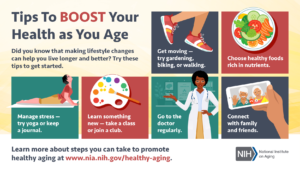To close out September, I learned it is Healthy Aging Month! Healthy Aging Month is a time to celebrate life and get ready for the physical and mental aspects of growing older.

#NIAHealth
Tips to Promote Healthy Aging
Many factors can influence healthy aging. While some of these factors, such as genetics, are not within our control, research shows there are steps you can take to help manage your health as you age. Even making small changes in your daily life can help you live longer and better.
- Take care of your physical health. Taking care of your physical health involves staying active, making healthy food choices, getting enough sleep, limiting your alcohol intake, and proactively managing your health care.
- Get moving! Physical activity is a cornerstone of healthy aging. Start slow and be consistent.
- Healthy eating: Learn more from the NIH HERE
- Sleep: Getting enough sleep helps you stay healthy and alert. Sleep quality matters for memory and mood.
- Visit your doctor regularly. Going to the doctor for regular health screenings is essential for healthy aging.
- Take care of Mental Health. Mental health, or mental wellness, is essential to your overall health and quality of life. It affects how we think, feel, act, make choices, and relate to others. Managing social isolation, loneliness, stress, depression, and mood through medical and self-care is key to healthy aging.
- Manage stress. Older adults are at particular risk for stress and stress-related problems. Finding ways to lower stress and increase emotional stability may support healthy aging. Participate in activities you enjoy!
- Leisure activities and hobbies are fun and can be good for your health!
- Take care of your cognitive health. Cognition — the ability to clearly think, learn, and remember — often changes as we age. Research shows that healthy eating, staying active, and learning new skills may help keep older adults cognitively healthy.

#NIAHealth
Next Steps
The NIH sums up Healthy Aging this way, “Taking care of your physical, mental, and cognitive health is important for healthy aging. Even making small changes in your daily life can help you live longer and better. In general, you can support your physical health by staying active, eating and sleeping well, and going to the doctor regularly.
Take care of your mental health by interacting with family and friends, trying to stay positive, and participating in activities you enjoy. Taking steps to achieve better physical and mental health may reduce your risk for Alzheimer’s and related dementias as you age.”
If you’re interested in learning more, here are some resources from the NIH.
- Learning about heart health and aging
- Exploring vitamins and minerals for older adults
- Finding tips for getting a good night’s sleep

Photo by Brett Jordan: https://www.pexels.com/photo/wood-typography-photography-blur-7939943/
Be Proactive
In aging and life, being proactive increases resilience. Life doesn’t wait for us to be ready.
My focus in contingency planning includes the practical details involved, resources to help you with industry sectors and professionals, and general resources to help you through tough times.
Happy to provide support for you, as this life throws curveballs your way. Reach out via Email or Message me if you have any questions. For additional information about my work check out @ The Living Planner or @ The Living Planner.
If you can join the “Get Your $tuff Together” free workshop on October 1st at 10a Pacific Time, I’d love to see you and begin planning for how to organize your important documents. Here is the registration link: Tuesday, October 1st at 10 am PT/1 pm ET! Register HERE
Quote to ponder this week: “The time for action is now. It’s never too late to do something.” — Antoine de Saint-Exupéry.
Have a good week! Lynn
#Can’tPredictCanPrepare #PlanfortheUnplanned

